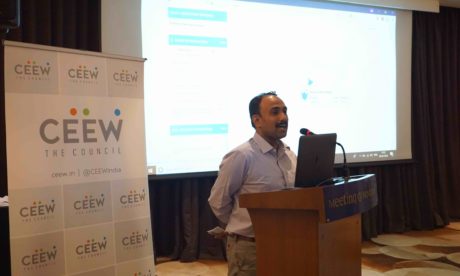Solar for Irrigation: Using a Decision Support Tool to Guide Action in West Bengal
CEEW, with support from the Deutsche Gesellschaft für Internationale Zusammenarbeit (GIZ) organised a State Workshop on 28 May in Lucknow to introduce the Solar Pumps Tool to stakeholders in West Bengal.
At the workshop, The Council introduced the tool, and solicited participants’ feedback on its utility to support evidence-based decision-making. Findings about the suitability of districts across Uttar Pradesh for solar-based irrigation, as derived from the portal were also shared at the workshop.
As the central government plans to revamp its solar pumps programme through the upcoming scheme, Kisan Urja Suraksha evam Utthaan Mahabhiyan (KUSUM), the workshop was also a useful forum for various stakeholders to convene and learn from each others’ perspectives.
View pictures from the Kolkata workshop.
Findings
• There is immense potential for individually owned off-grid solar pumps in 8 out of 18 districts of the state, owing to high concentration of diesel pumps and groundwater availability within safe limit. In the remaining districts, low crop revenue and low disbursement of medium and long-term bank loans among farmers could pose difficulty for farmers to purchase solar pumps. Greater support—through subsidies and credit access—could be provided to farmers in these districts to enable them to adopt solar pumps.
• Given high concentration of small and marginal farmers and groundwater availability within the safe limit throughout West Bengal, solar based water-as-a-service model can improve affordability of irrigation for the smallholders. As per a recent CEEW study, solar pump entrepreneurs can undercut the diesel-based water tariffs, offering relatively economical irrigation service to farmers.
• The Department of Power and Non-Conventional Energy Sources, Government of West Bengal initiated its target of segregating 621 feeders under ‘Deen Dayal Upadhyay Gram Jyoti Yojana’ (DDUGJY) the last year. Solarisation of feeders will emerge as a possibility once the segregation of agriculture feeders from the rest is accomplished across the state.
• 13 out of 18 districts, distributed across the state, indicate suitability for the promotion of small capacity solar pumps (1 HP and sub-HP) due to a relatively high proportion of marginal cultivators, high disbursement of institutional credit to these farmers, high share of horticulture crops, and groundwater availability within the safe limit. Installing small solar pumps in these districts would help marginal farmers meet their unmet irrigation needs and subsequently lead to an improvement in farmers’ income—a step towards ‘Doubling Farmers’ Income’. These pumps could also be used for lift irrigation and fisheries to enhance the discharge of water.
• In order to ensure long term availability of water, water saving technologies and practices such as drip irrigation should be promoted under ‘Per Drop More Crop’, one of the components of Pradhan Mantri Krishi Sinchayee Yojana. The farmers across the state are already growing horticulture, orchards, and other spaced crops suitable for implementing these technologies.



